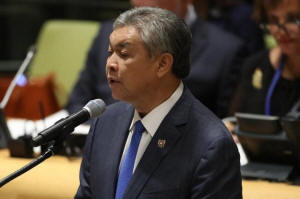|
Malaysia says talks on with North Korea
for return of nine citizens
 Send a link to a friend
Send a link to a friend
 [March 13, 2017]
By A. Ananthalakshmi and Ebrahim Harris [March 13, 2017]
By A. Ananthalakshmi and Ebrahim Harris
KUALA LUMPUR (Reuters) - Malaysia said
talks were underway on Monday for the release of nine citizens stranded
in North Korea by a travel ban, while its defense minister tried to ease
anxieties among the public about the risks of angering an unpredictable
nuclear-armed state.
Formerly friendly relations between the two countries soured in the wake
of an investigation into the murder in Kuala Lumpur last month of Kim
Jong Nam, the estranged half-brother of North Korea's leader, Kim Jong
Un.
Angered by the Malaysian police identifying North Korean suspects and
wanting to question others, including a diplomat at the embassy in Kuala
Lumpur, North Korea slapped a travel ban on Malaysians leaving its
borders, prompting tit-for-tat action by Malaysia.
Malaysia also expelled the North Korean ambassador, but in a bit to calm
relations Prime Minister Najib Razak said last week that ties with
Pyongyang would not be severed and talks are now on between the two
governments to settle their issues.
For Malaysia, the top priority is securing the freedom to bring home
three diplomats and their six family members who remain in Pyongyang.
"The negotiations with the North Koreans are ongoing," Deputy Prime
Minister Ahmad Zahid Hamidi told reporters.

"Our main priority is the safety of the nine Malaysians who are in
Pyongyang," he said.
Malaysian police say VX nerve agent, a chemical so deadly that it is
listed by the United Nations as a weapon of mass destruction, was used
to kill Kim Jong Nam, who had been living in exile in Macau and had
criticized his family's dynastic rule of North Korea in the past.
While an Indonesian woman and an Vietnamese woman have been charged with
the murder, police also identified eight North Koreans who they wanted
to question. Three are said to be hiding in the North Korean embassy in
Kuala Lumpur.
UNEASE
Postings on social media in recent days have reflected anxieties over
the risk that North Korea could retaliate violently if Malaysia pursued
the case too vigorously.
[to top of second column] |

Deputy Prime Minister Ahmad Zahid Hamidi of Malaysia speaks during a
high-level meeting on addressing large movements of refugees and
migrants at the United Nations General Assembly in Manhattan, New
York, U.S. September 19, 2016. REUTERS/Carlo Allegri

Defense Minister Hishammuddin Hussein sought to allay such unease in
comments to journalists in parliament on Monday, saying: "Even if
our relations are a rather tense, I don't think it will lead to
war."
Hishammuddin said that Malaysia could not match North Korea in terms
of military assets, but it could count on allies in the event of any
confrontation, while super powers had their own issues with North
Korea.
"This is our advantage, so don't worry," he said.
"We must look at our issue with North Korea within the appropriate
perspective," he added.
Meantime, no one from the victim's family has come forward to claim
the body, which North Korea wants returned to Pyongyang.
"We give ourselves two to three weeks to solve this problem," health
minister Dr. Subramaniam Sathasivam told reporters when asked when
and how Malaysia would release the corpse.
(Additional reporting by Emily Chow; Writing by Praveen Menon;
Editing by Simon Cameron-Moore)
[© 2017 Thomson Reuters. All rights
reserved.]
Copyright 2017 Reuters. All rights reserved. This material may not be published,
broadcast, rewritten or redistributed.
 |